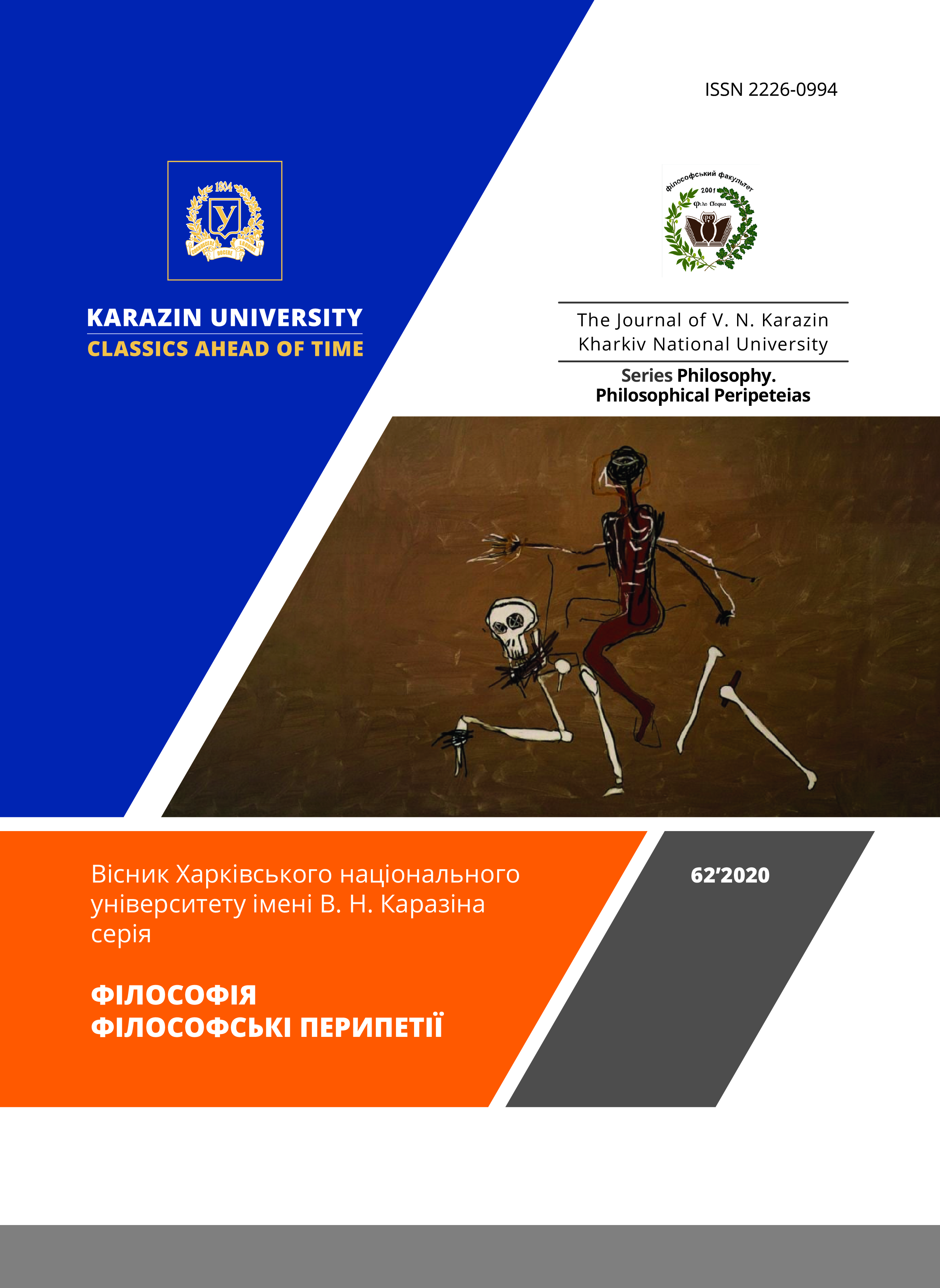EXISTENTIAL BASES OF GOOD
Abstract
The article is devoted to the consideration of the good nature existential foundations. Good, as a transcendental phenomenon, reveals itself in a person as a powerful mechanism of its internal development – spiritual needs. Need, unlike desire, is not just a requirement of the human body. Need is a way of relationship, that is, communication with objective reality. This life aspiration is responsible for the personality realization as an active, creative, responsible part of co-existence. Therefore, all aspects of human life and communication, and productivity, and harmony, depend on the state of the needs system satisfaction. It is these existential conditions that correspond to the principles of ethical absolutism. Thus, the intersection point of ethics and human (ethical and anthropological principles), the condition for the interaction and implementation of the principles of ethics is concentrated in the development of our soul needs. The soul seeks to go beyond the egoistic desires of the flesh. Therefore, to hear the “voice” of the soul (both one’s own and that of a loved one), to respond to its call, a person can only when the desire to know the world around him conquers the desire to possess this world. In this regard, we are talking about the fact that the basis for the spiritual needs of humans is the need for love. The need to love resonates with the basic ethical principle “love of one’s neighbor”. Therefore, working on our own egoism, we realize the whole complex of spiritual needs: in knowledge, communication, freedom, creativity. So, the need to love is the highest metaphysical force in which the nature of good is concentrated, both on the ontological and existential levels.
Downloads
References
/References
About Designated Human Ethical Law. Word of the Shepherd. Retrieved from https://mospat.ru/archive/page/vera-i-zhizn/slovo/30742.html. (In Russian).
Berdyaev, N. (2005). Dialectics of the Divine and the Human. Moscow: AST; Kharkiv: Folio. (Original work published 1947). (In Russian)
Betilmerzaeva, M. (2010). Ethnic Determination of Human Being. Philosophy and Cosmology, 9, 109–116. (In Russian).
Bible. (2020). (I. Ogienko, Trans.). Retrieved from https://bibleonline.ru/bible/ubio. (Original translation published 1962). (In Ukrainian).
Brodetskaya, Yu. (2014). Human Relations Society: In Search of Lost Integrity. Dnipro: Innovation. (In Russian).
Fromm, E. (1995). Healthy Society. (T. Banquetov, Trans.). Moscow: AST; Khranytel. (Original work published 1955). (In Russian).
Maslow, A. (1999) Motivation and Personality. (A. Tatlybaeva, Trans.). Saint Petersburg: Eurasia. (Original work published 1954). (In Russian).
Schedrovitsky, D. (2014). Introduction to the Old Testament. The Pentateuch of Moses. Мoscow: Terevinth. (In Russian).
Sinilo, G. (2015). Bible and World Culture. Minsk: Vysheishaia Shkola. (In Russian).
Бердяев Н. Диалектика божественного и человеческого. М.: АСТ; Харьков: Фолио, 2005. 623 с.
Бетильмерзаева М. Этноментальная детерминированность бытия человека. Философия и космология. 2010. T. 9. С. 109–116.
Біблія / пер. І. Огієнка. 2020. URL: https://bibleonline.ru/bible/ubio.
Бродецкая Ю. Общество человеческих отношений: в поисках утраченной целостности: Монография. Днепропетровск: Инновация, 2014. 370 с.
Маслоу А. Мотивация и личность / пер. с англ. А. М. Татлыбаевой. СПб.: Евразия, 1999. 478 с.
О предназначении человека и нравственном законе. Слово Пастыря. 2020. URL: https://mospat.ru/archive/page/vera-i-zhizn/slovo/30742.html.
Синило Г. Библия и мировая культура. Минск: Вышэйшая школа, 2015. 685 с.
Фромм Э. Здоровое общество / пер. с англ. Т. Банкетова. М.: АСТ; Хранитель, 2006. 539 с.
Щедровицкий Д. Введение в Ветхий Завет. Пятикнижие Моисеево. М.: Теревинф, 2014. 1088 с.

This work is licensed under a Creative Commons Attribution 4.0 International License.
Authors who publish with this journal agree to the following terms:
- Authors retain copyright and grant the journal right of first publication of this work under the terms of a license Creative Commons Attribution License 4.0 International (CC BY 4.0).
- Authors are able to enter into separate, additional contractual arrangements for the non-exclusive distribution of the journal's published version of the work (e.g., post it to an institutional repository or publish it in a book), with an acknowledgement of its initial publication in this journal.
- Authors are permitted and encouraged to post their work online (e.g., in institutional repositories or on their website) prior to and during the submission process, as it can lead to productive exchanges, as well as earlier and greater citation of published work.






3.gif)




